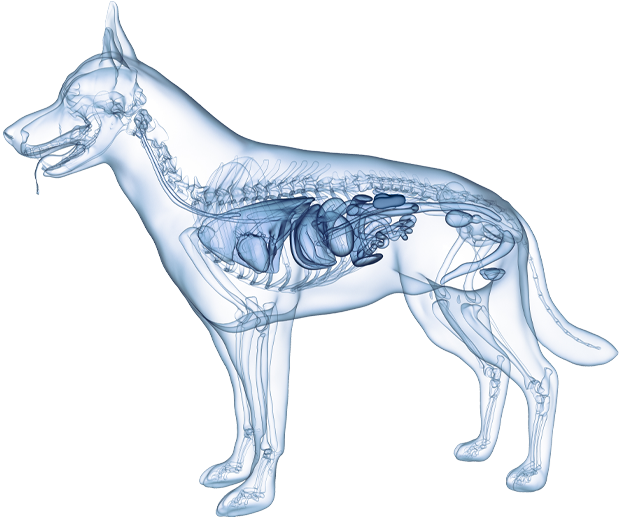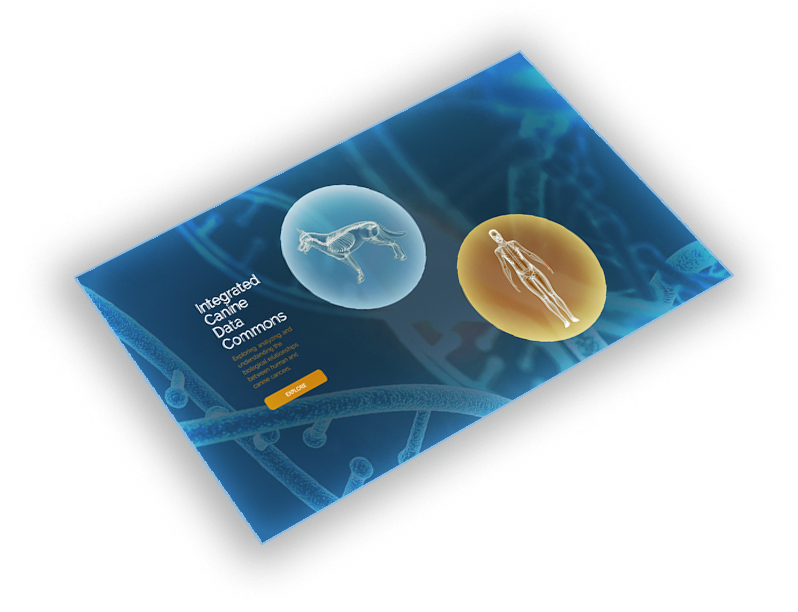Integrated Canine Data Commons
(ICDC)Overview
The Integrated Canine Data Commons (ICDC) was established to further research on human cancers by enabling comparative analysis with canine cancer. Canines have many genes similar to human genes, which are involved in cancers in similar ways. They develop spontaneous diseases and respond to treatments like humans, live in a family environment shared with humans, and like humans receive health care and participate in clinical trials. Canines are also of scientific interest because of their accelerated aging process.
The data in the ICDC are structured and queryable according to the ICDC data model. Submitted data are harmonized to maintain data and metadata consistency, integrity and availability to the ICDC users and the rest of the CRDC.
All data in the ICDC are open-access and, with appropriate attribution, can be included in publications. In addition to the ICDC’s graphical user interface, there is also an Application Programming Interface (API) that software programs may use to query the data.
The data files of the ICDC are available for analysis in the CRDC Cloud Resources. ICDC users can build cohorts of interest in the ICDC and then analyze the associated data files in the Seven Bridges Cancer Genomics Cloud, powered by Velsera (SB-CGC).
Data Types
The ICDC contains multiple data types.
| Experimental Strategy | Data Type | File Format |
|---|---|---|
| Clinical and Biospecimen | Clinical and Biospecimen Metadata | JSON |
| RNA-seq | Transcriptomics | BAM, TXT |
| Whole Genome Sequencing | Genomics | BAM, VCF |
| Whole Exome Sequencing | Genomics | BAM, VCF |
| Genotyping Array | Genomics | TXT |
| DNA Methylation Analysis | Genomics | BAM |
Datasets
| Study Code | Study Type | Study Name |
|---|---|---|
| COTC007B | Clinical Trial | Preclinical Comparison of Three Indenoisoquinoline Candidates in Tumor-Bearing Dogs |
| COTC022 | Clinical Trial | A Contemporaneous Controlled Study of the Standard of Care (SOC) in Dogs with Appendicular Osteosarcoma |
| GLIOMA01 | Genomics | Comparative Molecular Life History of Spontaneous Canine and Human Gliomas |
| MGT01 | Genomics | Molecular Homology and Differences Between Spontaneous Canine Mammary Cancer and Human Breast Cancer |
| NCATS-COP01 | Transcriptomics | Models for Diagnosis and Treatment of Human Cancers Using Comparative Canine-Human Transcriptomics |
| ORGANOIDS01 | Genomics | Characterization of Healthy and Urothelial Carcinoma Canine Organoids for Applications in Personalized Medicine and Translational Research |
| OSA01 | Genomics | A Multi-Platform Sequencing Analysis of Canine Appendicular Osteosarcoma |
| OSA03 | Genomics | Comparative Analysis Using Whole Genome Bisulfite Sequencing of Human and Canine Osteosarcoma |
| TCL01 | Genomics | Whole Exome Sequencing Analysis of Canine Cancer Cell Lines |
| UBC01 | Clinical Trial | Antitumor Activity and Molecular Effects of Vemurafenib in Dogs with BRAF-mutant Bladder Cancer |
| UBC02 | Genomics | Basal and Luminal Molecular Subtypes in Naturally-Occurring Canine Urothelial Carcinoma Are Associated With Tumor Immune Signatures and Dog Breed |
| UC01 | Genomics | Whole Exome Sequencing Analysis of Canine Urothelial Carcinomas without BRAF V595E |
| OSA03 | Genomics | Comparative Analysis Using Whole Genome Bisulfite Sequencing of Human and Canine Osteosarcoma |
Anatomical Sites
The ICDC contains data from multiple programs/projects/studies. The ICDC currently has data with multiple sites including:
- Bladder
- Bone
- Femur
- Humerus
- Mandible
- Radius
- Tibia
- Bone Marrow
- Brain
- Kidney
- Lung
- Lymph Nodes
- Skin

